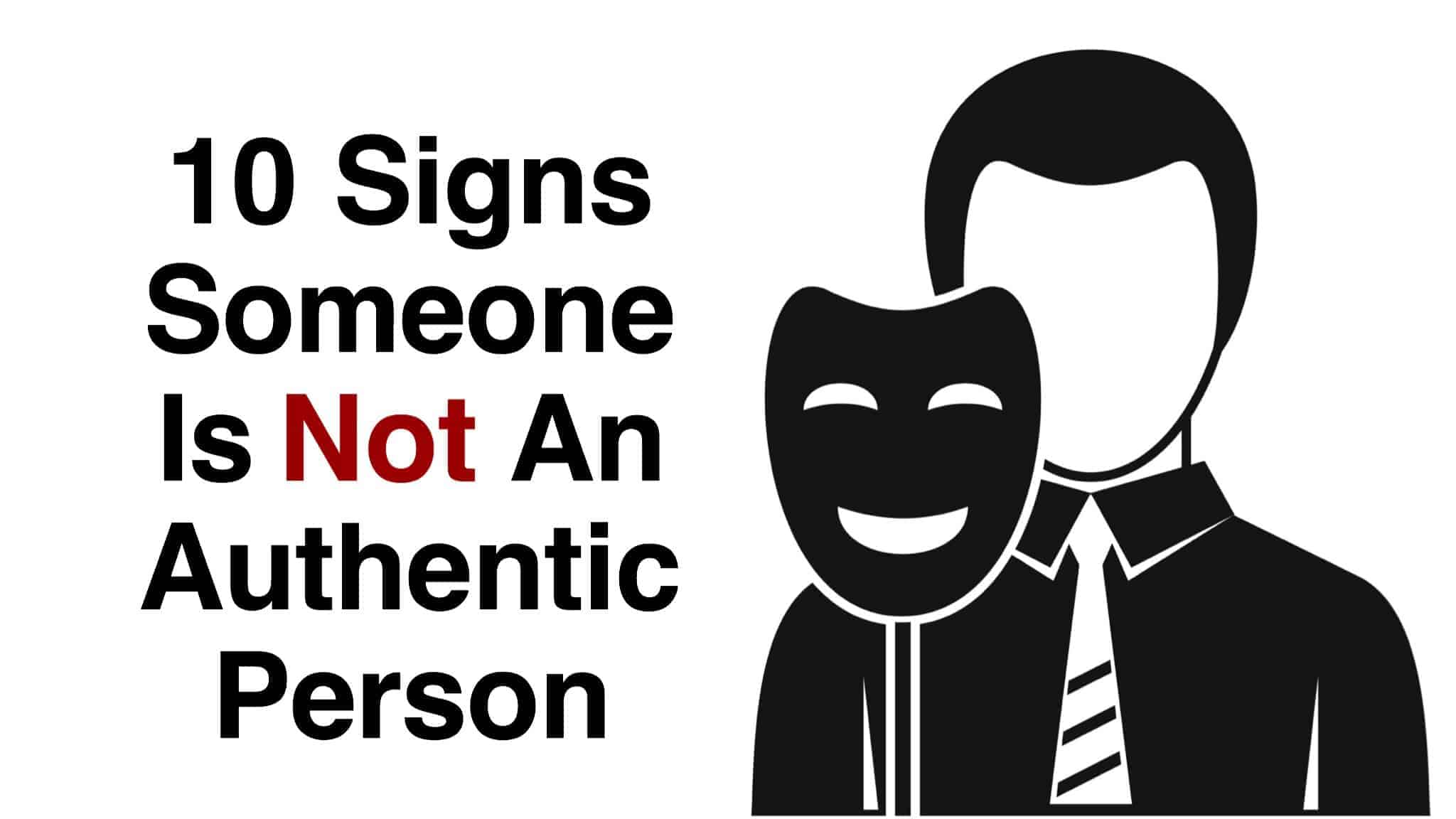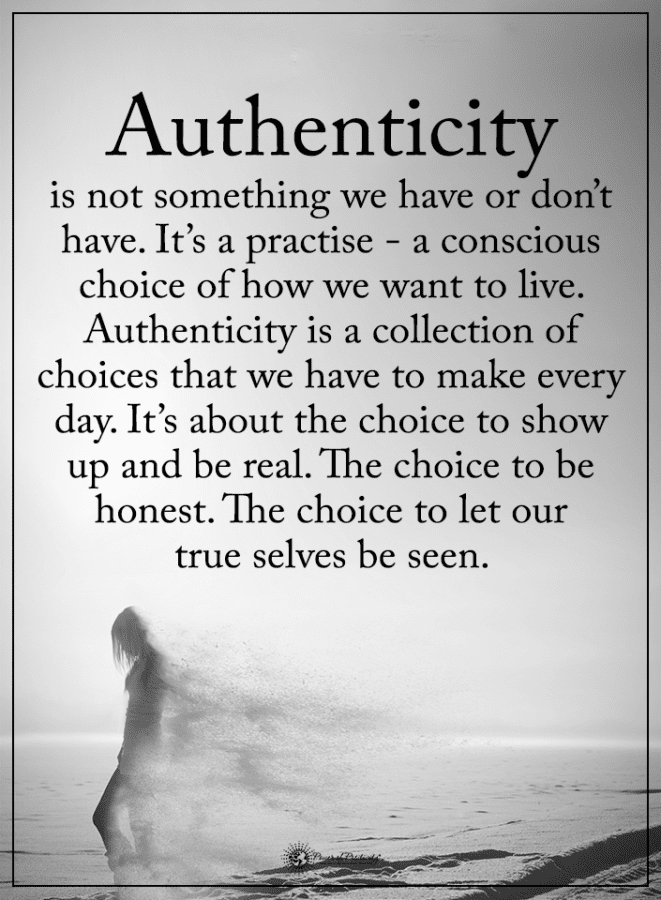We value authenticity in today’s society, and for excellent reason. When someone is not authentic, they betray themselves and others and are not afraid to show their vulnerabilities or flaws. However, not everyone is as genuine as they may seem. In fact, some people are skilled at masking their true intentions or putting up a facade. Spotting the signs of an inauthentic person can be crucial in avoiding potential pitfalls or forming meaningful relationships.
The High Value of an Authentic Person
First and foremost, being around authentic people can provide a sense of safety and security. When you are with someone genuine and sincere, you are more likely to feel comfortable and at ease, knowing that they have your best interests at heart. Authentic people are less likely to be judgmental or critical and more likely to offer a kind, listening ear or a shoulder to lean on. This kindness can help create a supportive environment that encourages growth and healing.
Furthermore, being around authentic people can inspire you to be your best self. Seeing others living authentically and pursuing their passions can motivate you to do the same. Authentic people often lead by example, showing that it is possible to live a fulfilling life by being true to yourself. An authentic person can help you discover your values and goals and confidently pursue them.
Surrounding yourself with authentic people can lead to deeper, more meaningful relationships. When people are authentic, they are more likely to be vulnerable and open, which can foster deeper connections and a sense of intimacy. Authentic people are also more likely to communicate honestly and respectfully, which can help build trust and respect in a relationship.
10 Signs Someone is Not An Authentic Person
“To be yourself in a world that is constantly trying to make you something else is the greatest accomplishment.” – Ralph Waldo Emerson
1. Inauthentic people are people-pleasers
Inauthentic people may be people-pleasers for a variety of reasons. They may need to be liked or accepted by others and go to great lengths to avoid conflict or discomfort. Inauthentic people may also be more focused on external validation and on meeting the expectations of others, rather than on their own needs or desires. As a result, they may be more inclined to put the needs and desires of others before their own, even if it means compromising their authenticity or values. Inauthentic people-pleasers may also struggle to say no or set boundaries, which can lead to resentment or frustration.
2. Inauthentic people have their agenda
They may be motivated by personal gains, such as financial or personal advancement. They may also be motivated by a desire to manipulate or control others, or to further their beliefs or ideologies. Inauthentic people may use manipulation and deception in order to achieve their goals, and they may be willing to bend or distort the truth to do so. It is essential to be aware of these agendas and to be cautious of people who may be motivated by their interests rather than the interests of others.
3. Inauthentic people manipulate the truth
Inauthentic people can manipulate the truth in various ways, including omitting critical information, lying by omission, spinning, gaslighting, and presenting false or misleading information. They may also use tactics such as false equivalences to present two things as if they are equivalent or equally valid, when in fact they are not. Inauthentic people may use these tactics to deceive or mislead others or to further their agendas.
4. Inauthentic people are misinformed
Inauthentic people can be misinformed in a variety of ways. They may rely on unreliable sources of information, such as rumors or conspiracy theories, rather than seeking out reliable and well-verified sources. They may also be susceptible to confirmation bias, where they only seek information supporting their preexisting beliefs or biases. Inauthentic people may also be more likely to fall victim to propaganda or manipulation by others who seek to deceive them. Additionally, inauthentic people may be more prone to cognitive biases and logical fallacies, which can lead them to draw incorrect conclusions from their information.
5. Inauthentic people are irresponsible
Inauthentic people may be irresponsible for a variety of reasons. They may be more focused on their desires and goals and less considerate of their actions’ impact on others. Inauthentic people may struggle to follow through on their commitments or take responsibility for their mistakes, as they may be more focused on avoiding discomfort or conflict. Additionally, inauthentic people may be more prone to making impulsive or irresponsible decisions, as they may be less inclined to think things through or to consider the consequences of their actions.
6. Inauthentic people are envious
Authentic people are encouragers – they motivate and support others to do their best and to “keep going.” One big failing of our society is the lack of individual accountability. Responsibility for oneself and the encouragement of others is critical if we are to evolve as a race and society. On the other hand, an authentic person does not need the approval of random masses on social media.
7. Inauthentic people are materialistic
Materialism refers to the belief that material possessions or wealth are essential values in life. Some inauthentic people may be materialistic because they value accumulating wealth or acquiring material possessions. They find motivation in the status or power of these things. Thus, they’re often willing to manipulate or deceive others to acquire them. Inauthentic and materialistic people may be more concerned with appearance and surface-level appearances than genuine connections or authentic relationships. However, it is vital to note that not all inauthentic people are materialistic and that many other motivations can drive inauthentic behavior.
8. Inauthentic people lack empathy
Inauthentic people may lack empathy due to self-absorption. They lack genuine connection with others. They’ll often have a limited understanding of other people’s feelings and experiences and insincerity in their interactions. These factors can make it difficult for inauthentic people to understand and connect with the emotions of others. That later leads to a lack of empathy. However, it is important to note that not all inauthentic people lack empathy and that many other factors can influence a person’s level of empathy.
9. Inauthentic people are closed minded
Inauthentic people may be closed-minded for a variety of reasons. They may resist new ideas or ways of thinking and may be unwilling to consider alternative viewpoints or perspectives. This closed-mindedness may be due to a lack of curiosity or a desire to hold onto preexisting beliefs and biases. Inauthentic people may also be more prone to confirmation bias, where they only seek information supporting their preexisting beliefs and ignore or dismiss information that challenges them. This closed-mindedness may also be due to a fear of change or uncertainty, as inauthentic people may be more comfortable with the familiar and known.
10. Inauthentic people forgo self-improvement
There are many possible reasons why inauthentic people may forgo self-improvement. These include a lack of awareness, motivation, or introspection. They might also stem from a fear of change or a lack of genuine connection with others. It is important to note that not all inauthentic people forgo self-improvement, and many other factors can influence their willingness to work on self-improvement. Some people may not see the value in self-improvement or may not believe that it is possible to change. Others may be resistant to change or uncertain about how to improve themselves. Some people may also fear failure or vulnerability, making it challenging to work on self-improvement. Additionally, some people may not have the necessary support or resources to work on self-improvement. Others do not have the motivation or discipline to take action.
Final Thoughts on Breaking Close Ties to Someone Who Is Not an Authentic Person
Many factors can contribute to a person being inauthentic. Some people may be inauthentic as a coping mechanism to avoid difficult emotions or situations. Others may be inauthentic to fit in or to be accepted by a particular group or society. Some people may also be inauthentic to protect themselves or to avoid vulnerability. Inauthenticity can also result from past experiences or traumas that have left a person disconnected from their true self. Additionally, some people may be inauthentic due to societal or cultural expectations. Society encourages them to present a particular image or persona to the world.
Conversely, enjoying the company of an authentic person can bring many benefits to your life. From feeling safe and supported to being inspired to pursue your passions, building deeper relationships, and becoming more authentic, there are countless reasons to seek out and embrace authenticity. So, reflect on the people you surround yourself with. Consider whether they are an authentic person. If not, consider seeking new connections to bring positivity and authenticity to your life.
















 Community
Community

